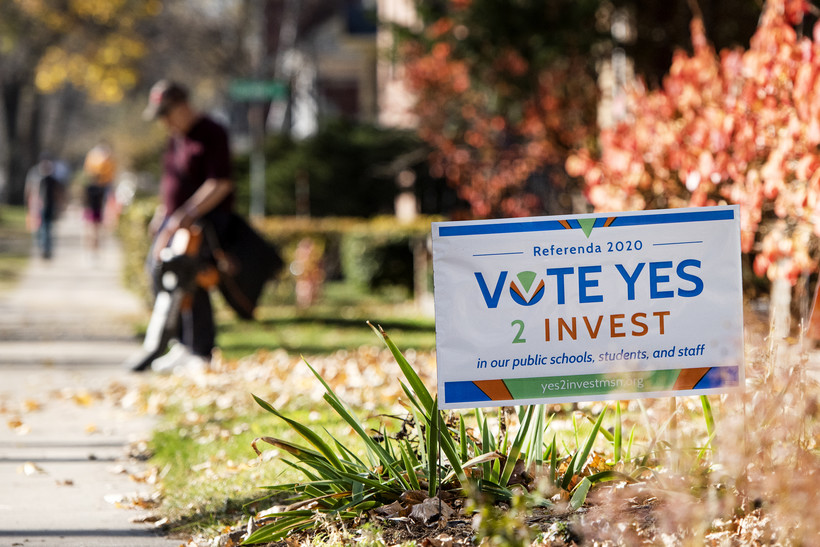School Referendums Seek Record $1.9 Billion
At least 50 school districts in state want voters to approve tax hikes this fall.

A yard sign in front of a home in Madison encourages residents to vote for a referendum Thursday, Nov. 5, 2020. Angela Major/WPR
At least 50 Wisconsin school districts will ask voters to approve tax hikes this fall, with districts seeking a record $1.9 billion in borrowing and spending authority in referendum questions on ballots around the state Nov. 8.
Districts still have time to finalize additional ballot questions, but as of Friday there were 70 separate referendum questions from 50 school districts across the state going to voters. Around half of the questions seek borrowing authority for new buildings or maintenance projects. The rest ask for approval to exceed state revenue limits on temporary or ongoing basis to pay for education, operations or staffing.
This fall, the School District of La Crosse tops the list with the biggest ask this cycle, with a $194.7 million borrowing authority request for construction of a consolidated high school and renovations to other school buildings.
Dan Rossmiller, government relations director for the Wisconsin Association of School Boards, said districts are turning to voters because Republican state lawmakers froze district spending by not adjusting revenue limits. Therefore, he said even though lawmakers increased general school aids by $706 million in the current state budget, money had to go toward lowering property taxes.
“And so for most districts, that means that their budgets are frozen,” said Rossmiller. “And with inflation and competition from the private sector driving up wages and salaries, school districts are hard-pressed to meet the demands that they need to attract and retain staff, including teachers, and pay their other expenses, which are going up with this frozen budget.”
Rossmiller said the federal aid wasn’t equally distributed across schools in the state, with those enrolling fewer students from low-income families getting less.
“And even though, I think, many legislators envisioned that school districts would spend the federal money to kind of tide them over with regard to their operating expenses,” said Rossmiller. “School districts have to be very careful about spending one-time federal money, which is going to run out soon on ongoing expenditures. That just creates a bigger budget problem down the road when the federal money goes away.”
Verona Area School District Deputy Superintendent Chad Wiese said it’s “a risky endeavor” to use one-time funding to pay for increased salary and benefits packages. He said revenue limits, inflation and competition for teachers and staff are precisely why the district is asking voters to support a $19 million recurring referendum. That means the school board will be able to exceed revenue limits by up to that amount, though Wiese said the district has told citizens it won’t use the full authority in the first year.
He said the district negotiated with teachers and other employees on a zero percent cost of living raise in July pending the outcome of the referendum in November. If voters reject the request, he said the district will be faced with tough choices, as 80 percent of the budget goes toward pay and benefits.
In 2017, voters approved a referendum seeking borrowing authority for a new school in Verona.
Across Wisconsin, voters have been increasingly willing to support raising their own property taxes to support schools in recent years. A Wisconsin Policy Forum analysis in 2020 found approval rates rose from around 60 percent in 2000 to around 80 percent that year.
But Rossmiller of the Wisconsin Association of School Boards said voter approval of referendums ebbs and flows with economic conditions, especially when districts ask to borrow large amounts of money for building projects.
Listen to the WPR report here.
Public schools seeking record $1.9B in spending authority through referendums was originally published by Wisconsin Public Radio.





















